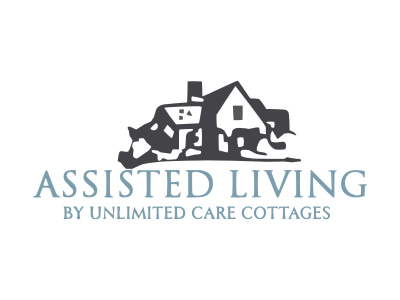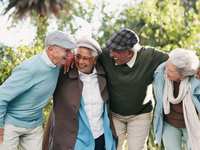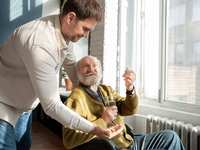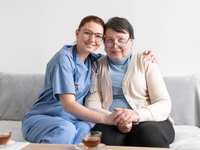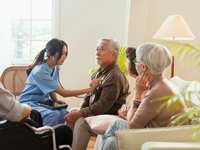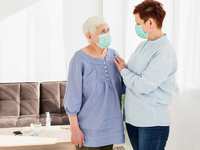- Categories :
- More
Bringing Together Seniors for Breast Cancer Awareness
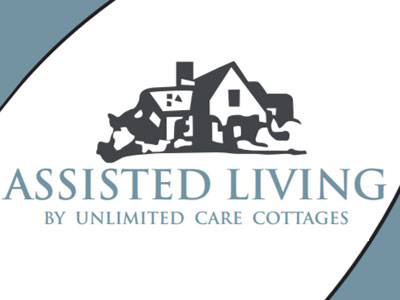
Breast cancer impacts countless lives, yet seniors might not always find themselves at the center of awareness campaigns. This blog post will explore practical ways to engage the older population in breast cancer awareness, focusing on tailored educational programs and empowering social events. Readers will learn the significance of memory in advocating for health, the advancements in the quest for a cure, and how initiatives like reverse mortgage programs in Nevada can support these causes. They will also discover how technology facilitates connection and advocacy among seniors. Addressing the gap in awareness for this age group, this content provides valuable insights to foster a community enlightened on breast health.
Key Takeaways
- Community workshops in nursing facilities boost senior engagement in breast cancer awareness
- Well-designed education materials for seniors promote informed decisions about breast healthcare
- Interactive sessions and social events can magnify the impact of cancer awareness efforts in senior communities
- Virtual platforms and social media groups extend breast cancer education to seniors in remote areas
- Personal stories within senior communities reinforce the importance of screenings and shared support
Engage Seniors in Breast Cancer Awareness Initiatives
In Georgia, where the spirit of community thrives, engaging seniors in breast cancer awareness is pivotal. Organizing community workshops not only educates but encourages active participation among long-term care facility residents. Furthermore, by fostering an environment that prompts seniors to join awareness campaigns, facilities promote advocacy and support for those affected. This subsection will detail the practical steps to involve seniors effectively, from phone outreach initiatives to post-surgery support networks, ensuring they have the necessary contacts and resources.
Organize Community Workshops for Senior Participation
Community workshops within nursing facilities offer a dynamic platform for fostering senior engagement in breast cancer awareness. Particularly in West Virginia, where such initiatives are crucial, professionals can introduce educational programs that allow residents to share personal experiences, thereby creating a supportive living environment. Physicians, as guest speakers, can provide invaluable insights, ensuring that seniors receive accurate information and understand the importance of regular screenings and self-exams.
In Montana, where access to healthcare resources may be limited for some seniors, carefully organized community workshops serve as a bridge, connecting them with essential information and support. By creating these opportunities for learning and discussion, facilities demonstrate a commitment to the well-being of their residents. Such forums enable the integration of first-hand expertise from local healthcare providers, empowering seniors with the knowledge to advocate for their health and that of others in their community.
Encourage Seniors to Join Awareness Campaigns
In Connecticut, facilitating connections between seniors and breast cancer awareness campaigns can significantly impact understanding and prevention. Residential care facilities have the unique ability to cultivate a community spirit that encourages collective action against this pervasive illness. By engaging seniors to support and participate in events such as fundraising walks and educational seminars, these institutions help to promote knowledge about the types and stages of breast cancer, including metastasis, thereby fostering a proactive approach to health management among the elderly populace.
In Pennsylvania, where communities value strength in unity, it is critical for assisted living facilities to build alliances that promote engagement in breast cancer awareness. One practical method is to establish contracts with local health organizations, enabling residents to access current information and actively partake in support groups and campaigns. This strategy not only educates seniors on the various breast cancer types but also instills a sense of empowerment and camaraderie as they band together in the fight against a common threat, demonstrating that age is not a barrier to advocacy and support.
Develop Educational Programs Tailored for Older Adults
To bolster breast cancer awareness among seniors, it is crucial to develop educational programs with age-appropriate materials and interactive learning sessions. Creating content specifically for residents in assisted living can ensure that crucial information about nutrition, maintaining quality of life, and overall senior care is communicated effectively. Upcoming segments will elaborate on crafting relevant health educational materials and hosting engaging sessions tailored to the unique needs of the older adult demographic.
Design Age-Appropriate Breast Health Materials
Creating educational materials for seniors that address breast health must consider cognitive factors such as brain health and comprehension abilities often synonymous with aging. It is imperative to leverage simple language and clear visuals that integrate seamlessly within the broader context of Medicare and healthcare resources, equipping them with the knowledge needed for informed decision-making. Social work professionals may contribute to this effort by providing insights into the socio-economic factors, such as wealth disparities, that affect seniors’ access to cancer care resources.
Moreover, in crafting these materials, the experts must ensure they resonate with the daily realities of the senior demographic, potentially including references to routine activities like laundry – a task that might become challenging during treatment. By taking into account both the physical and emotional hurdles encountered during cancer care, the education provided can offer practical solutions, optimize the support framework available to seniors, and ultimately enhance their autonomy and quality of life in personal care cottages and beyond.
Host Interactive Educational Sessions for Seniors
Interactive educational sessions offer immense value for seniors, providing a platform to discuss and understand breast cancer’s complexities, including the resources available from entities like Genworth Financial for long-term care planning. Such programs in Philadelphia, for instance, can incorporate practical guidance on navigating health care systems, ensuring residents are equipped to make informed choices about their home care and palliative care options.
The impact of these sessions is greatly amplified when they include experiential learning aspects that cater to the older adults’ unique learning styles. By integrating knowledge with direct engagement, such as discussing the practicalities of receiving health care at home or managing chronic illnesses with palliative care, seniors in these communities can relate more personally to the information presented, which empowers them to take proactive steps in their health management.
Promote Social Events to Unite Seniors for the Cause
Engagement through social events is instrumental in uniting senior communities for breast cancer awareness. By arranging fundraisers that harness the collective spirit of Rhode Island’s elder population and facilitating support groups in Vermont for those undergoing menopause and related treatments like radiation therapy, senior living options transform into hubs of advocacy and solidarity. This subsection will provide key strategies to implement such initiatives, enhancing connections and offering enriching experiences.
Arrange Fundraisers Involving Senior Communities
In Colorado, senior communities are uniquely positioned to host fundraising events that bolster breast cancer awareness and directly engage residents in the cause. These gatherings can serve as poignant reminders of the ongoing risk that breast cancer poses and the importance of therapies available, seamlessly tying in elements like the celebration of survivors or remembrance of loved ones through themed activities that resonate on a personal level.
In New Mexico, the creation of fundraisers by expert planners within the assisted living domain showcases the potential to tailor these events to the interests and abilities of seniors, focusing on inclusivity and accessibility. For instance, a ‘Pink Ribbon Craft Fair’ not only raises funds but also stimulates creativity and awareness about nipple-sparing mastectomy and other treatment options, empowering seniors to contribute meaningfully to the cause and potentially aid others in recognizing early signs and symptoms.
Facilitate Support Groups for Senior Women
Facilitating support groups in assisted living environments offers senior women a means to share experiences and gain insights about breast cancer, reinforcing the importance of proactive health management. A registered nurse can lead these groups, lending their clinical expertise to discussions about carcinoma types, treatment options like hospice care, and how to live a quality life in an independent living village. These support sessions act as a beacon of camaraderie and emotional strength, aiding in the navigation through a breast cancer diagnosis and beyond.
For senior women, locating “independent living near me” equipped with support resources provides not only comfort but also a critical network of support. Tailored to the unique social dynamics of a village-like community, these gatherings can touch upon everything from early detection to coping with the long-term impacts of treatment. Fostered by empathetic guidance, these groups transform individual challenges into collective triumphs, underscoring the profound role community plays in every stage of breast cancer awareness and care.
Utilize Senior Centers to Spread Breast Cancer Awareness
Senior centers serve as vital hubs for disseminating breast cancer awareness, leveraging collaborations with local organizations to enhance policy advocacy in Kansas. In Mississippi, providing screening information at senior facilities is supplemented by oncology specialists who explain hormone therapies and their implications. These initiatives ensure that seniors gain valuable insights, contributing to informed decision-making and fostering a supportive healthcare environment.
Collaborate With Local Senior Organizations
Collaboration between senior centers and local medical organizations amplifies the effectiveness of breast cancer awareness campaigns, especially for those dealing with metastatic breast cancer. These partnerships ensure seniors living with the disease receive comprehensive information regarding treatment options, payment assistance programs, and available support systems, thus enabling informed healthcare decisions in the realm of senior living.
Senior organizations that join forces with oncology specialists foster an environment where knowledge about breast cancer transcends the purely medical aspect. By integrating health education with pragmatic insights into navigating disease management, residents are better prepared to confront the complexities of metastatic breast cancer within their senior living communities, reinforcing a network of support and advocacy.
Provide Screening Information at Senior Facilities
In Boston, senior centers are pivotal in disseminating vital breast cancer screening information, addressing a critical component of elderly care. Educators and healthcare professionals employ straightforward, clear language to explain the significance of early detection and the process involved in screenings such as mammograms, which may include the investigation of symptoms like nipple discharge – a potential alarm signal. These facilities thus play a key role in alleviating concerns and facilitating informed decisions amongst seniors.
Moreover, in Iowa’s senior communities, the provision of breast cancer screening information forms the cornerstone of health education initiatives. Representatives from local healthcare providers conduct sessions that outline the steps and importance of regular screenings, emphasizing how this proactive measure fits within a comprehensive approach to elderly care. Such efforts are instrumental in fostering a culture of health awareness and empowering seniors with the information necessary for maintaining their well-being.
Leverage Technology to Connect Seniors Virtually
In an age where technology bridges distances, leveraging virtual platforms offers senior citizens in the North Shore and Houston areas innovative ways to engage with breast cancer awareness. The subsequent segments will explore how geriatric-focused online webinars can provide education on emergency protocols and treatments, while social media groups create avenues for senior engagement and support. These digital initiatives reflect a commendable stride in adapting awareness strategies to the age of interconnectedness, ensuring that crucial health information reaches every individual, irrespective of their physical location.
Set Up Online Webinars Focused on Senior Education
Online webinars have become instrumental in extending breast cancer education to senior communities, particularly in states like New Hampshire, where remote areas may limit access to in-person resources. Through these virtual seminars, occupational therapy practitioners can introduce seniors to the latest research, demonstrating exercises and routines designed to aid recovery and improve daily life post-treatment. Such educational sessions, delivered virtually, can effectively bridge the geographical gaps between health professionals and “senior communities near me,” enriching residents with current, actionable knowledge.
In Oklahoma, setting up specialized online webinars for senior education fosters a connection between cutting-edge cancer care research and the daily experiences of the elderly. These webinars allow experts to tailor their delivery to the specific needs of senior audiences, ensuring that each participant can understand and apply the information within the context of their living situation. Consequently, seniors are empowered to stay abreast of advancements in treatment and prevention, reinforcing their proactive engagement in health management, irrespective of their location.
Create Social Media Groups for Senior Engagement
In Alabama, the rise of digital connectivity is reshaping vibrant senior living, as caregivers are creating social media groups aimed at uniting older residents in advocating for breast cancer awareness. Through these groups, seniors in Oregon can easily share resources, participate in virtual discussions, and find emotional support. This approach to community building not only fosters a sense of inclusion and purpose among older individuals but also serves as a crucial touchstone for exchanging knowledge and experiences with breast health.
In Missouri, social media has emerged as a pivotal tool for senior engagement, connecting those often isolated by geography or mobility limitations with fellow advocates and caregivers. Such virtual communities offer practical advice, enhance awareness of prevention strategies, and ensure that every member has access to the latest updates in breast cancer research and care. By tapping into these digital avenues, senior care facilities can bolster their residents’ proactive involvement and provide continuous education in an ever-evolving healthcare landscape.
Empower Seniors as Advocates for Breast Health
Empowering seniors as advocates for breast cancer awareness is both transformative and life-affirming. Training seniors in independent living-assisted environments equips them to lead awareness activities, crucial in promoting early detection and management of skin-related health issues. Moreover, when these articulate individuals share their personal experiences, they enhance collective understanding and support within their community. This initiative addresses not only the activities of daily living but also underscores the cost-effectiveness of informed health management, especially in densely populated areas like New York City.
Train Seniors to Lead Awareness Activities
Independent living facilities near me have a unique opportunity to harness the wisdom and experience of their senior residents by offering training that positions them as leaders in breast health awareness activities. Through carefully crafted workshops, these senior living communities can provide the necessary tools and knowledge for seniors to effectively draw attention to the importance of early detection and treatment of breast cancer, thus successfully weaving a thread of advocacy through the fabric of their shared experience.
By instilling the skills needed for leadership in health initiatives, seniors can amplify the message of prevention and awareness, bringing both happiness and a sense of purpose to their roles as advocates. The empowerment and training of seniors within these communities not only stimulate a proactive stance on health matters but also inspire admiring attention from younger generations, reinforcing the significance of lifelong learning and community participation.
Encourage the Sharing of Personal Experiences
Encouraging the sharing of personal experiences within senior communities significantly bolsters initiatives to support breast cancer awareness. When individuals vocalize their journey with breast cancer, covering aspects from early symptoms to post-biopsy recovery, it demystifies the disease and highlights personal risk factors for breast cancer. This practice not only instills a sense of solidarity but also underscores the importance of regular screenings and appropriate life insurance to manage potential financial implications.
Within the sphere of senior living, firsthand accounts of dealing with weight loss during treatment or navigating the complexities of health insurance to cover a biopsy are invaluable. These stories resonate with seniors, offering practical and relatable insights, especially in settings like assisted living in The Woodlands. Such narratives foster an environment where seniors feel empowered to openly discuss their health, supporting breast cancer awareness with conviction. Equipped with this knowledge, residents often become advocates for preventive measures, effectively spreading the message throughout their community.

